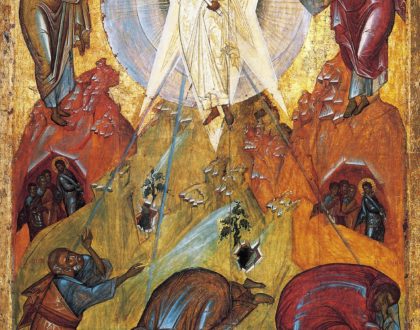June 18 // Psalm 33
by Julie Hordyk
Opening Prayer
Blessed are those whose way is blameless,
Psalm 119:1-3
who walk in the law of the Lord.
Blessed are those who keep his decrees,
who seek him with their whole heart,
who also do no wrong,
but walk in his ways.
The Greatness and Goodness of God
1 Rejoice in the Lord, O you righteous.
Praise befits the upright.
2 Praise the Lord with the lyre;
make melody to him with the harp of ten strings.
3 Sing to him a new song;
play skillfully on the strings, with loud shouts.4 For the word of the Lord is upright,
and all his work is done in faithfulness.
5 He loves righteousness and justice;
the earth is full of the steadfast love of the Lord.6 By the word of the Lord the heavens were made,
and all their host by the breath of his mouth.
7 He gathered the waters of the sea as in a bottle;
he put the deeps in storehouses.8 Let all the earth fear the Lord;
let all the inhabitants of the world stand in awe of him.
9 For he spoke, and it came to be;
he commanded, and it stood firm.10 The Lord brings the counsel of the nations to nothing;
he frustrates the plans of the peoples.
11 The counsel of the Lord stands forever,
the thoughts of his heart to all generations.
12 Happy is the nation whose God is the Lord,
the people whom he has chosen as his heritage.13 The Lord looks down from heaven;
he sees all humankind.
14 From where he sits enthroned he watches
all the inhabitants of the earth—
15 he who fashions the hearts of them all,
and observes all their deeds.
16 A king is not saved by his great army;
a warrior is not delivered by his great strength.
17 The war horse is a vain hope for victory,
and by its great might it cannot save.18 Truly the eye of the Lord is on those who fear him,
on those who hope in his steadfast love,
19 to deliver their soul from death,
and to keep them alive in famine.20 Our soul waits for the Lord;
he is our help and shield.
21 Our heart is glad in him,
because we trust in his holy name.
22 Let your steadfast love, O Lord, be upon us,
even as we hope in you.
Grab Your Harps
Psalm 33 opens with a jolt. It’s not the only one to do so. Several psalms burst right out of the gates like horses to the track. There’s a shout. There’s fanfare. Grab your pianos, banjos, and guitars! Lift your voices! It’s time to praise the Lord! Psalms burst out of the gates for different reasons though. This time, the psalmist urges the crowd into worship for two connected reasons: First, praise the Lord because of his great creative power. Second, trust the Lord because he watches over us.
Not every psalm of adoration instructs worshipers to grab their instruments. That stands out to me because of something else the psalmist says. He notices that the kings of the earth reach for their armies when they’re in danger; and that soldiers reach for their warhorses (vv. 16-17). In a psalm about worship and trust in Almighty God, that can’t be an accident.
Hebrew poetry often uses parallelism as a rhetorical device. You don’t have to know much about literary theory to understand what that means. When two adjacent lines of poetry either restate each other, saying “yes and yeah”, or say something directly the opposite of each other, “not this but that,” we’re reading parallelism. It’s a simple way to reinforce and deepen the meaning of what we say. For a people who, for centuries, preserved scripture primarily in their minds rather than in written form, parallelism is a memory aid as well. Why bring this up? Verses 10, 11, and 12 each consist of their own parallel statements:
10 The Lord brings the counsel of the nations to nothing;
he frustrates the plans of the peoples.
11 The counsel of the Lord stands forever,
the thoughts of his heart to all generations.
12 Happy is the nation whose God is the Lord,
the people whom he has chosen as his heritage.
See how the first line of each verse agrees with its second line. The three statements build on each other to create a central thesis, which runs something along the lines of “Trust ONLY in God!” I think you’re supposed to linger there for a moment.
And while you’re there, singing praises about the goodness of the Lord with a harp in your hand, I think you’re supposed to realize how hollow the force of an army is; how frail the might of a warhorse is compared to that of God Almighty.
We wait for the Lord;
he is our help and shield.
I wish I knew which kings the psalmist was thinking of, and which soldiers. Were the Israelites being threatened by someone at the time? If so, was the call to “grab your instruments and sing” meant also as an act of defiance against that enemy? Was the psalmist simply praying for shalom?
That comparison between harps and warhorses helps me see — or perhaps hear — with greater clarity what it is that God intends for the world. The other comparisons do too. Until the Kingdom arrives, waiting, rejoicing, trusting, and hoping are where we belong. Fighting, plotting, and escaping are not.
May your faithful love rest on us, Lord
for we put our hope in you.
Closing Prayer
Keep, O Lord, your household the Church in your steadfast faith and love, that through your grace we may proclaim your truth with boldness, and minister your justice with compassion; for the sake of our Savior Jesus Christ, who lives and reigns with you and the Holy Spirit, one God, now and for ever. Amen.
Collect, the Book of Common Prayer
Recommended Posts

“The Prayers of the Saints” Sermon Series
September 17, 2020

The Lord’s Prayer Curriculum | Personal or Small Group Study
September 17, 2020
July 15 // Psalm 139
July 16, 2020
